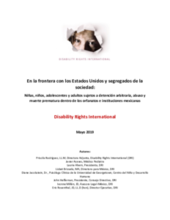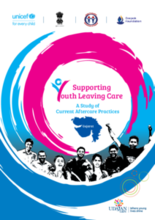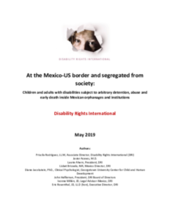Displaying 461 - 470 of 1510
Despite the importance of training residential youth care professionals to increase their professional competences, little attention has been paid so far to the influence of training on the behaviour and skills of residential professionals. This study aims to gain greater insight into the effects of training on the skills of these professionals.
The objectives of this study were: (a) to measure the time-to-initial placement change in different types of settings, including non-relative foster homes, kinship care, residential treatment centers (RTC), group homes and other types of settings; and (b) to identify predictors of the initial placement change.
The goal of this study was to examine whether and how alternative kinship structures were reproduced in Charitable Children’s Institutions (CCIs) in Kenya.
This study focused on health promotion for children and young adults who live in residential care institutions in Portugal.
The objective of this research project was to profile the experiences of survivors abused in long-term child care in Scotland, and to develop a model which linked maltreatment, risk and protective factors, and outcomes.
Disability Rights International (DRI) llevó a cabo dos investigaciones en Baja California, México –la primera en noviembre de 2018 y la segunda en febrero de 2019, visitando a cuatro instituciones privadas en las que se encuentran niñas, niños, adolescentes y personas –incluidas personas migrantes– con discapacidad. Este informe presenta los resultos de esta investigación.
“Current Aftercare Practices” (CAP) is a documentation exercise designed to look at the support and services received by Care Leavers (CLs) from the objective lens of an ‘Aftercare Quality Index’ (AQI), calculated using the scores within 8 domains. This report covers a total of 104 CLs from Gujarat, comprising of 63 males and 41 females, from both Government and NGO-run Child Care Institutions (CCIs).
“Current Aftercare Practices” (CAP) is a research study designed to look at the support and services received by Care Leavers (CLs) from the objective lens of an ‘Aftercare Quality Index,’(AQI), calculated using the scores obtained on 8 domains. This report covers a total of 108 CLs from Karnataka, comprising of 47 males and 61 females, from both Government and NGO-run Child Care Institutions (CCIs).
Given the impact that institutional care has been found to have on psychological and cognitive outcomes, the authors make the case for the adaptation of Early Childhood Child Care HOME (EC-CC-HOME), a world-renowned instrument that assesses children’s child-care environment, to the Greek context.
Disability Rights International (DRI) carried out two investigation trips to Baja California, Mexico, in November 2018 and February 2019, visiting four residential, private institutions for children and adults – including migrants - with disabilities. This report presents the findings from these investigations.




